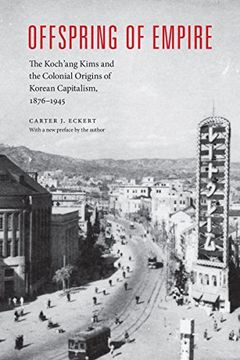Share
Offspring of Empire: The Koch'ang Kims and the Colonial Origins of Korean Capitalism, 1876-1945 (Korean Studies of the Henry m. Jackson School of International Studies) (in English)
Carter J. Eckert (Author)
·
University Of Washington Press
· Paperback
Offspring of Empire: The Koch'ang Kims and the Colonial Origins of Korean Capitalism, 1876-1945 (Korean Studies of the Henry m. Jackson School of International Studies) (in English) - Carter J. Eckert
$ 38.00
$ 47.50
You save: $ 9.50
Choose the list to add your product or create one New List
✓ Product added successfully to the Wishlist.
Go to My WishlistsIt will be shipped from our warehouse between
Monday, June 10 and
Tuesday, June 11.
You will receive it anywhere in United States between 1 and 3 business days after shipment.
Synopsis "Offspring of Empire: The Koch'ang Kims and the Colonial Origins of Korean Capitalism, 1876-1945 (Korean Studies of the Henry m. Jackson School of International Studies) (in English)"
According to conventional interpretations, the Japanese annexation of Korea in 1910 destroyed a budding native capitalist economy on the peninsula and blocked the development of a Korean capitalist class until 1945. In this expansive and provocative study, now available in paperback, Carter J. Eckert challenges the standard view and argues that Japanese imperialism, while politically oppressive, was also the catalyst and cradle of modern Korean industrial development. Ancient ties to China were replaced by new ones to Japan - ties that have continued to shape the South Korean political economy down to the present day.Eckert explores a wide range of themes, including the roots of capitalist development in Korea, the origins of the modern business elite, the nature of Japanese colonial policy and the Japanese colonial state, the relationship between the colonial government and the Korean economic elite, and the nature of Korean collaboration. He conveys a clear sense of the human complexity, archival richness, and intellectual challenge of the historical period. His documentation is thorough; his arguments are compelling and often strikingly innovative.
- 0% (0)
- 0% (0)
- 0% (0)
- 0% (0)
- 0% (0)
All books in our catalog are Original.
The book is written in English.
The binding of this edition is Paperback.
✓ Producto agregado correctamente al carro, Ir a Pagar.

